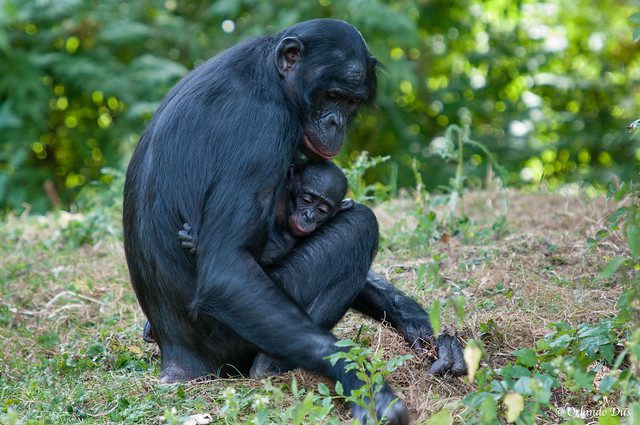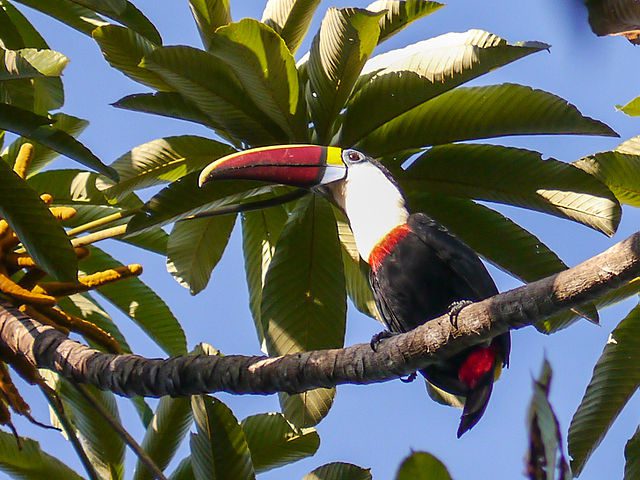


Ashley Judd and the Bonobo Conservation Initiative: Bonobos are the world’s least-recognized great ape, and humanity’s closest living relative. This endangered species lives exclusively in Africa’s Congo Basin, in the Democratic Republic of the Congo (DRC). Only an estimated 15,000 bonobos remain in the wild—poaching and habitat loss are pushing them to the brink of extinction. Bonobo societies are matriarchal, and unlike our other closest relatives, chimpanzees, are incredibly peaceful. Female-led groups of bonobos are highly empathic, and use affection rather than aggression to resolve conflict and to strengthen social bonds.
>>>Urge the Democratic Republic of the Congo to protect our closest living relatives and their rainforest home.
Change.org: Chickens on factory farms are bred to grow so big, so fast, that they often collapse under their own weight. Many live in constant pain, and they are vulnerable to broken legs and heart attacks. These smart and social birds spend their entire lives in crowded, dimly-lit sheds without even a perch to rest on. Restaurants like Subway, Burger King, Sonic and many more have already committed to criteria that reduce the suffering of chickens. They are switching to healthier breeds and giving chickens more room to roam. If all of these other companies can do it, why can’t McDonald’s?
>>>Urge McDonald’s to stop using chickens who are bred to suffer.
ASPCA: New York has one of the country’s highest number of dog retailers. At any given point, there are approximately 2,000 puppies for sale throughout the state. Pet shops often source their puppies from out-of-state, low-welfare, commercial breeding facilities (a.k.a. puppy mills), then offer them up to unsuspecting customers as healthy, high-quality puppies from responsible breeders. This practice is deceptive and leaves families to bear the costs associated with this cruel industry. New Yorkers have an opportunity to make a huge difference for pets this year by supporting a bill to prohibit the sale of dogs, cats and rabbits in pet stores across the state.
>>>New Yorkers, tell your legislators to support A.6298/S.4234 to End Puppy Mill Cruelty in New York State.
Audubon California: In 2017, the Trump Administration reversed decades of government policy—by both Democratic and Republican administrations—to dramatically weaken the Migratory Bird Treaty Act. The MBTA has been the foundation of protections for migratory birds in North America for more than a century, saving billions of birds. The federal government now says it will no longer prosecute unintentional killing—called incidental take—of birds from commercial and industrial activities, including massive avian crises caused by oil spills like Exxon-Valdez or Deepwater Horizon. California Assembly Bill 454, authored by Assembly Member Ash Kalra, will ensure California’s birds are protected. The oil industry’s main lobbying arm in Sacramento has declared its opposition, and is fighting hard to so that polluters and other industries can kill birds without any consequences.
>>>Urge the California Assembly to vote yes on AB454.
Cause for concern…

- Anti-vaxxers are now not vaccinating their pets and it’s putting them in danger (Jessica Chambers, Mamamia)
- Millions of birds are vacuumed to death every year for our martini olives (Jelisa Castrodale, Vice)
- More than 27,000 species are threatened with extinction—that’s more than 27% of all assessed species (IUCN Red List)
- Trump administration opens up Minnesota wilderness area to copper mining (Valerie Volcovici, Reuters)
- Missouri poised to eliminate local factory farm regulation (Leah Douglas, New Food Economy)
Round of applause…

- How to make money off rainforests without cutting them down (Lucas Foglia, Bloomberg Businessweek)
- New Yorkers temporarily stop controversial Williams fracked gas pipeline in New York Harbor (Fossil Free/350.org)
- Thousands march for animal rights in Hong Kong with protesters demanding abusers get 10 years behind bars (Ng Kang-chung, South China Morning Post)
- Here’s a list of officially cruelty-free brands (Suzana Rose, Cruelty-Free Kitty)
- 7 ways to attract more butterflies to your garden—and save them from extinction (Jill Ettinger, One Green Planet)
Parting thought…
“Hunting is not a sport. In a sport, both sides should know they’re in the game.” —Paul Rodriguez